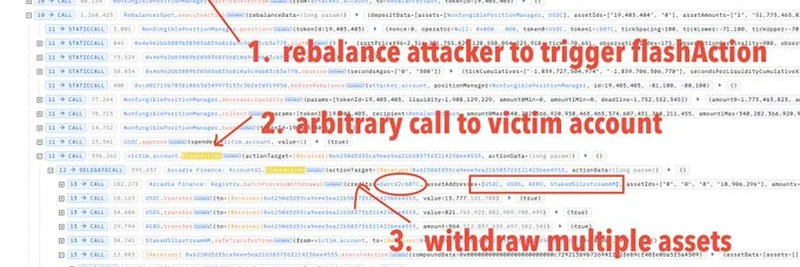Hey there, crypto enthusiasts! If you’ve been keeping an eye on the DeFi space, you’ve probably heard about the recent ArcadiaFi hack that shook the blockchain world. Posted on X by Chaofan Shou (@shoucccc) on July 15, 2025, this incident resulted in over $2 million in losses due to a sophisticated exploit. Let’s break it down in simple terms and explore what happened, why it matters, and what it means for the future of decentralized finance.
What Happened in the ArcadiaFi Hack?
The ArcadiaFi protocol, which operates on Ethereum and Optimism, fell victim to a clever attack that leveraged its rebalancing process. Rebalancing, in simple terms, is like adjusting the weights of assets in a portfolio to keep things balanced—think of it as reorganizing your investment basket. However, in this case, the attacker turned this feature into a weapon.
The exploit started with the attacker triggering a “rebalance attack” to initiate a flashAction. This allowed them to craft special data that let the rebalancer make unauthorized calls to any account. From there, the attacker chained these calls to re-enter the system, ultimately targeting victim accounts. The end result? They withdrew multiple assets while only repaying a single debt—essentially a high-tech heist!
The image shared in the tweet (see above) breaks it down into three key steps:
- Rebalance attacker to trigger flashAction: The attacker manipulated the rebalancing process.
- Arbitrary call to victim account: They made unauthorized moves on victim accounts.
- Withdraw multiple assets while repaying only one: The big payout, leaving the protocol short.
How Did the Attack Work?
Digging a bit deeper, the attacker exploited a vulnerability in the Rebalancer.executeAction function, which is only callable by an Account, and the Account.flashAction, which is exclusive to the Rebalancer. By chaining calls like Rebalancer.rebalance(controlled_data) → Account1.flashAction(controlled_data) → Rebalancer.executeAction(controlled_data) → Account2.flashAction(controlled_data), they passed custom data to manipulate the system.
The flashAction function accepts an array of debt and underlying assets, which the rebalancer typically controls. The attacker hijacked this by specifying fewer debt assets to repay while withdrawing the full balance from victim accounts. It’s like borrowing a small amount but taking everything from the vault—pretty sneaky, right?
Why This Matters for DeFi
This hack is a wake-up call for the DeFi community. While the earlier ArcadiaFi breach in July 2023 (which lost $455,000) was analyzed by firms like Immunebytes, this 2025 exploit shows that vulnerabilities can evolve. The lack of reentrancy protection (where a function is called repeatedly to drain funds) and poor input validation were key weaknesses. It highlights the need for stronger security measures, like better health checks for vaults and stricter data controls.
For meme token enthusiasts and blockchain practitioners, this incident underscores the importance of understanding smart contract risks. Even protocols with innovative ideas can fall prey to exploits if the code isn’t airtight.
What’s Next for ArcadiaFi and DeFi Security?
The ArcadiaFi team will likely work with security experts to patch these vulnerabilities and recover what they can. For the broader DeFi ecosystem, this could push for more audits and the adoption of tools like Revoke.cash to protect users. It’s also a reminder to stay informed—whether you’re trading meme tokens or diving into DeFi protocols, knowing the latest security news is key.
At Meme Insider, we’re committed to keeping you updated on these developments. Bookmark our site for the latest on meme tokens, blockchain tech, and security insights. Have thoughts on this hack? Drop them in the comments below—we’d love to hear from you!


